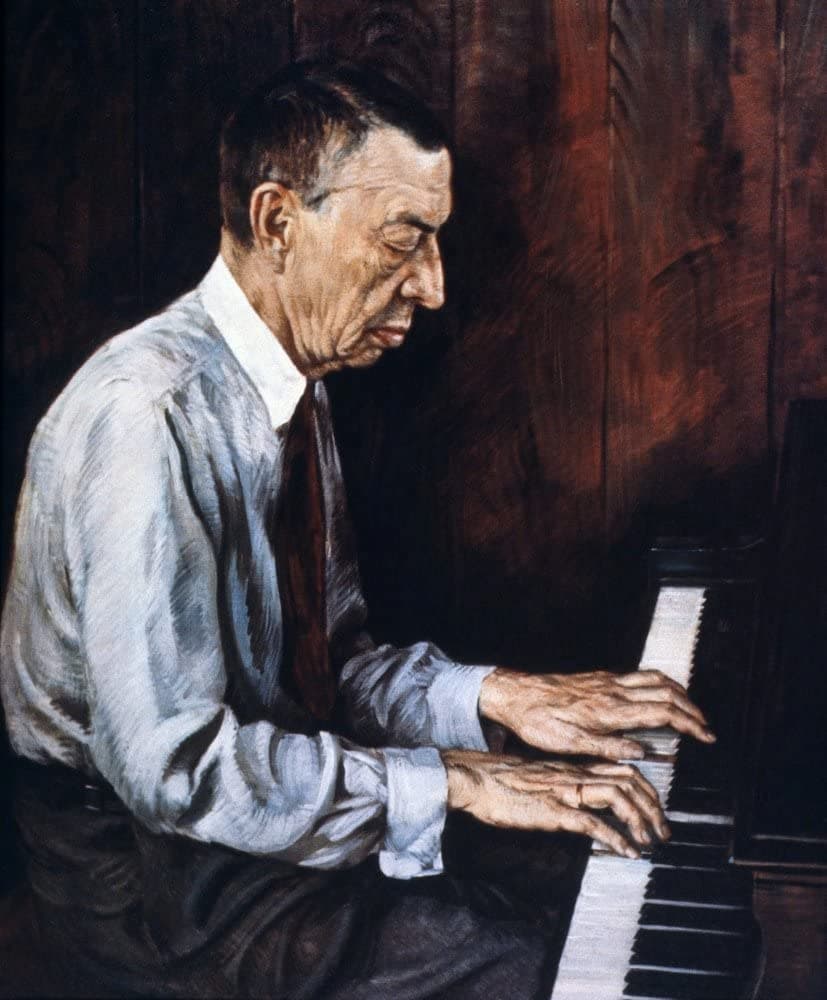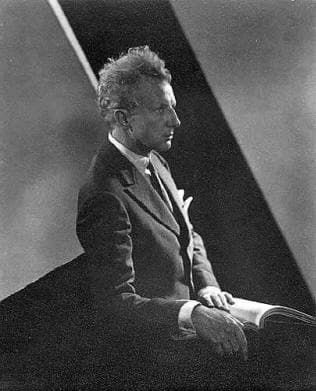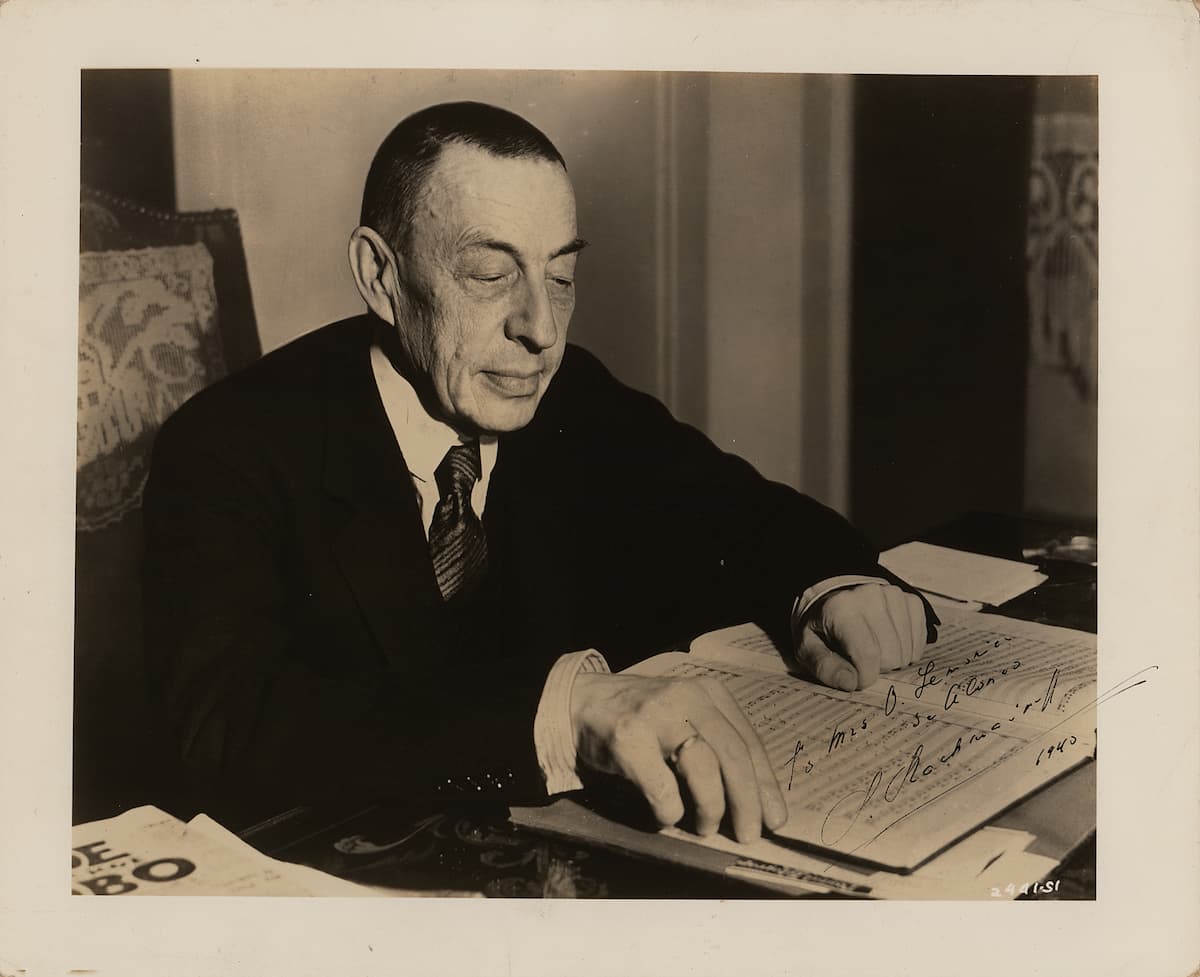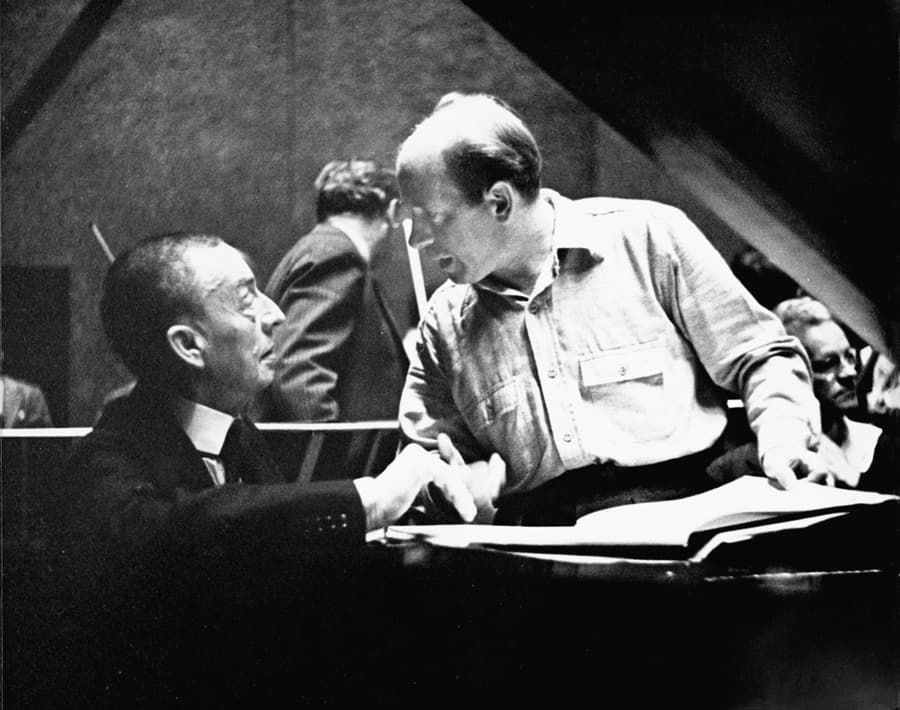On 18 March 1927, audiences in the city of Philadelphia, USA were in high anticipation as Leopold Stokowski and the Philadelphia Orchestra had invited Sergei Rachmaninoff as the soloist for the premiere of the composer’s Fourth piano concerto in G minor. Rachmaninoff had come to the United States in 1918, and finding himself in great demand as a soloist and conductor had entirely concentrated on performing. In fact, he had not produced a single new composition for nine years. Everybody thought he had given up composing completely, so audiences and critics were eager to witness the Rachmaninoff resurrection.

A painting of Rachmaninoff playing the piano by Boris Chaliapin
In the event, critics were not impressed. Pitts Sanborn in the New York Evening Telegram complained that the piece was “long-winded, tiresome, unimportant, in places tawdry.” Lawrence Gilman of the Herald Tribune went even further, dismissively calling the work “essentially nineteenth century.” Rachmaninoff was shattered, but he was painfully aware that his music was out of step with the times. “I feel like a ghost wandering a world grown alien,” he had remarked in 1926. “I cannot cast out the old way of writing, and I cannot acquire the new. The new kind of music seems to come, not from the heart, but from the head. Composers think rather than feel.”
Sergei Rachmaninoff: Piano Concerto No. 4 in G minor, Op. 40 “Allegro Vivace”
“I glanced at its size – 110 pages – and I was terrified!”

Leopold Stokowski, 1927
We still don’t know exactly when Rachmaninoff started work on his fourth piano concerto. The origins may date back as far as 1911, and he did mention a new concerto in April 1914 to a friend. Forced to leave Russia, he apparently took the concerto drafts with him to the West, and quietly worked on it over the next couple of years. However, it took the encouragement from his good friend Nikolai Medtner, to whom the concerto is dedicated, before Rachmaninoff engaged with the work in earnest. Once it was written out, Rachmaninoff quickly became his own worst critic. He wrote to Medtner on 9 September 1926, “Just before leaving Dresden I received the copied piano score of my new concerto. I glanced at its size – 110 pages – and I was terrified! Out of sheer cowardice I haven’t yet checked its time. It will have to be performed like the ‘Ring’ on several nights in succession. And I recalled my idle talk with you on the matter of length and the need to abridge, compress, and not to be loquacious. I was ashamed! Apparently the whole trouble lies in the third movement. What I must have piled up there! I have already started (in my mind) to look for cuts.”
Sergei Rachmaninoff: Piano Concerto No. 4 in G minor, Op. 40 “Largo” (Alexander Ghindin, piano; Helsinki Philharmonic Orchestra; Vladimir Ashkenazy, cond.)
The Revisions Profession

Sergei Rachmaninoff
With Rachmaninoff detailing several cuts and questioning the orchestration, Medtner tried to reassure him. “Actually,” he writes, “your concerto amazed me by the fewness of its pages, considering its importance.” He put the matter into exact focus maintaining that his friend didn’t actually suffer from a fear of length but from a fear of boredom. Initially, Rachmaninoff was also critical of the role of the orchestra, as it was almost never silent. “It’s less like a concerto for piano and more like a concerto for piano and orchestra,” he wrote. After the disastrous premiere of the work, Rachmaninoff immediately embarked on a number of cuts and revisions. He made small cuts to the opening movement and removed a few bars from the central Largo, but he substantially shortened the Finale. Rachmaninoff handed the revised version to TAIR in Paris, and the work was first published in 1928. It was performed in the UK in 1929, and appeared on the European continent by 1930. Critical and audience reaction, however, was still unfavorable, and Rachmaninoff withdrew the work on short notice.
Sergei Rachmaninoff: Piano Concerto No. 4 in G minor, Op. 40 “Allegro Vivace” (Bernd Glemser, piano; Polish National Radio Symphony Orchestra; Antoni Wit, cond.)

Sergei Rachmaninoff and Eugene Ormandy, 1938
In the event, it took Rachmaninoff roughly 15 years before he once again turned his attention to the 4th concerto in 1941. In fact, “it became the last original composition on which he worked.” The composer revised the orchestration, simplified the piano writing in the Largo, and substantially rewrote the Finale. This final version once again premiered in Philadelphia with Eugene Ormandy conducting. A critic wrote, “The Fourth Concerto as heard yesterday is a revision of a work first heard here 14 years ago… The revision is extensive… With all due respect to the great artist who wrote it, and for all its fine pianism, it was a trifle dull.” Some pianists and scholars have suggested, “that Rachmaninoff got everything about the Fourth Concerto right the first time.” They have expressed disappointment that he yielded to public opinion, weakening “what had initially been a powerfully original work.” There are, however, dissenting opinions that hold that Rachmaninoff did not go far enough in his revisions. “If Rachmaninoff had tackled the basic structural deficiencies of the work, it might have been received more sympathetically than it actually was.” In the event, you are most likely to hear the 1941 version in performances today.
For more of the best in classical music, sign up to our E-Newsletter
Sergei Rachmaninoff: Piano Concerto No. 4 in G minor, Op. 40

All Rachmaninoff works are fantastic.
James E Foster M D, a friend of Van Cliburn.
Clearly, Rachmaninoff lost confidence in his own creativity, which is a shame. There is very little of his output that I don’t love. I would love to hear a recording of both his early and later versions of this concerto. I am sure there is plenty of inspiration in all his attempts worth hearing.
mi Dios, de dondde saco tanta fuerz.a es UNIVESAL. Todos los astos les dieron su propia energia para componer semejante concierto.
Graias a Dios que exixste Rachmaninoff, toavia, aunque par los pianisas debe se una tortura enorme.PpERO AL FINAL SE CONSIGUE
There have been many genius even miraculous composers in the past, & I appreciate them all but Rachmaninov’s 2nd piano concerto for me, tops them all & it is amazing that he could put together so many notes in perfect order on paper & end up with such memorable tunes throughout the composition, & be able to play them all himself. He & Tchaikovsky are two Russians that the world can be immensely proud of. Da iawn dros ben am byth. Geraint (o Gymru). Ebrill 2023.